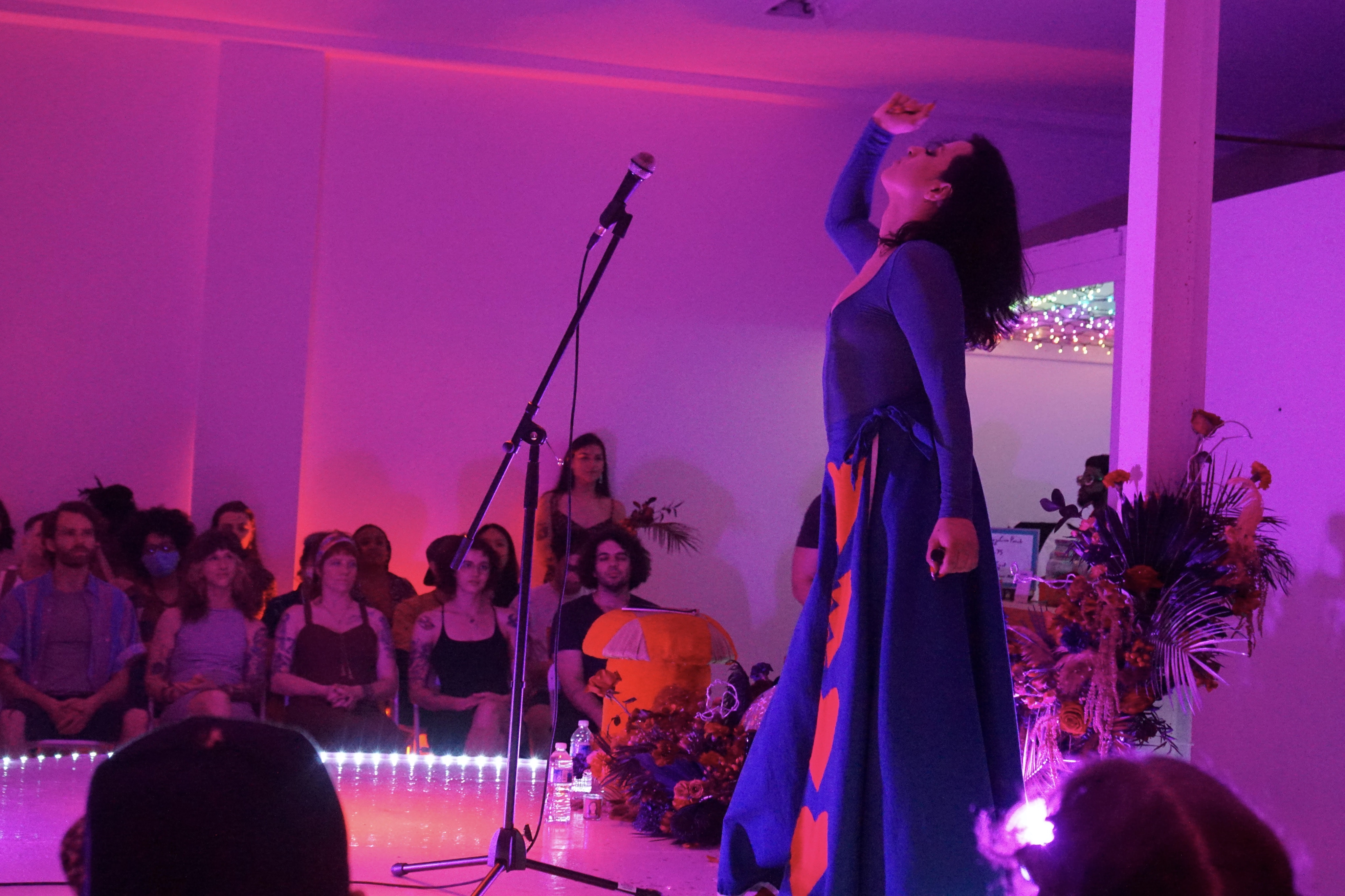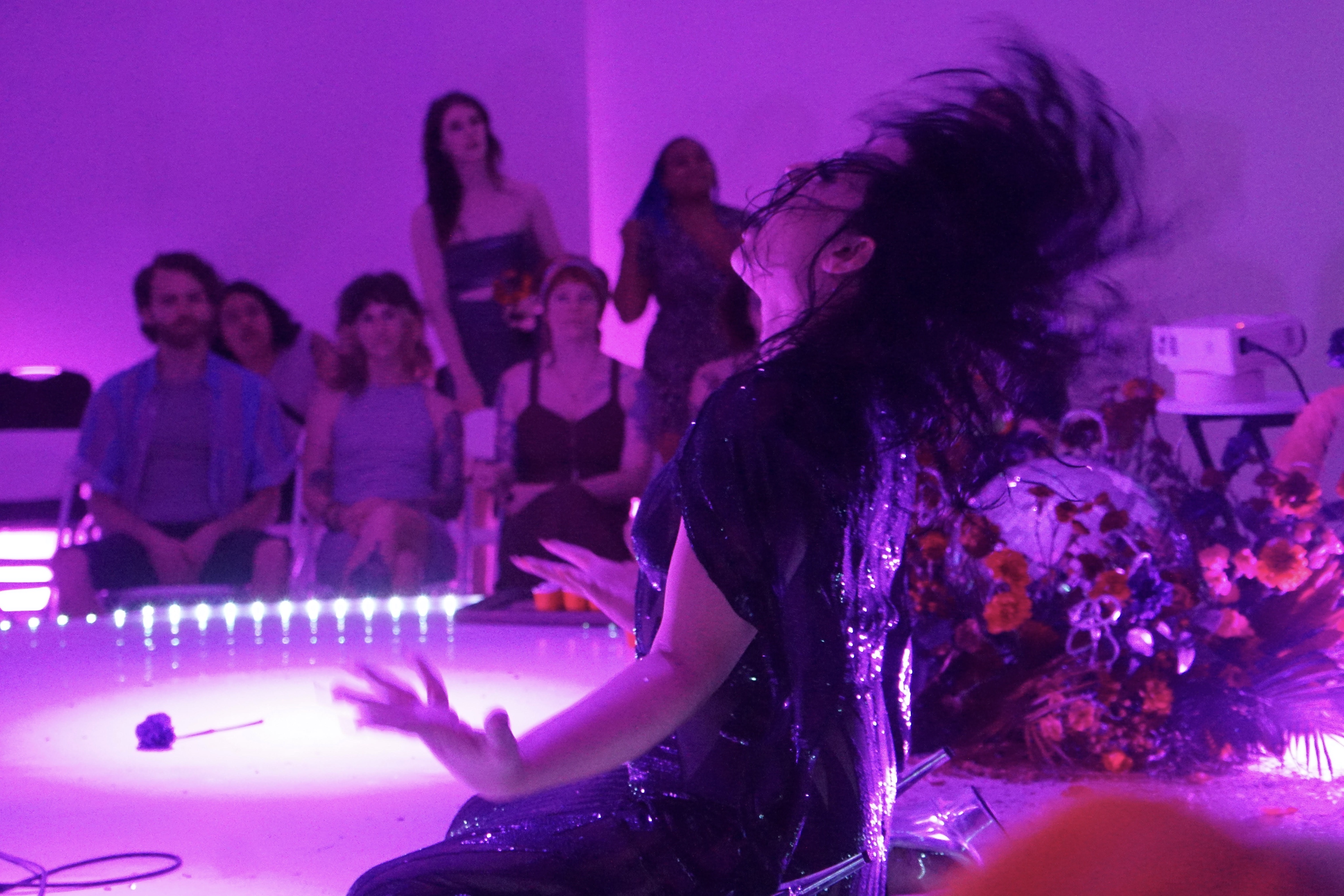

Joss Barton, The Summer I Got Bit (May 2022). Photo courtesy of Nanyamka Ewing, Mammoth Photography.
︎ Chicago
That’s the Way Love Is: Review of Joss Barton’s The Summer I Got Bit Performance
Review
Eva Pensis
“The mic has to be off, right?” she asked from the center of the stage. Behind her lay an altar, at its center a giant disco ball bordered with floral arrangements, winding garland, and humble offerings: bottles of water, champagne, and poppers. At various points throughout the performance, she would pause to inhale the fumes, a fitting ceremonial rite for the Midwest-based poet-prophetess’s “disco death dream farewell performance.” Joss Barton, a native of St. Louis, MO, was relocating to Chicago after over a decade of performing and organizing in St. Louis. The farewell was also a fare-thee-well community gathering in St. Louis where Barton performed her poem (self-published as a zine) The Summer I Got Bit at the close of May 2022. What began as a warm commemoration and celebration of Barton’s contribution to the DIY queer/trans brown and Black community of artists, performers, and creatives quickly escalated into a charged stalemate between Barton and the venue’s manager. The evening’s lineup of performances was running over its allotted time and the manager of the space—Aurora STL—was not having it.
You could cut the tension in the air, as the saying goes, with a knife—although Barton’s stiletto pumps would have done the job just as well. Barton was reading from the epilogue of her poem when the manager interrupted her performance. Promptly at 10:00pm, the manager shut off the audio equipment, claiming that the noise from the show might disturb neighbors that, “if the cops were called,” would supposedly put the manager’s business license in jeopardy. Marketed as the newest pole dance studio in St. Louis, Aurora STL initially welcomed the experimental and multi-genre work that Barton had convened. Over the course of the event, it became clear that this support was conditional. Amid the standstill, the audience members, who lined Aurora’s interior at standing capacity, looked around anxiously, unsure whether the manager was going to further escalate the establishment’s measures to stop Barton mid-performance.
Fortunately for the audience, Barton’s voice carries: hers is a voice you will hear, even if you don’t want to hear it—and that is precisely the point. As soon as the audio equipment was cut, the audience grew quieter as she delivered the final stanzas of her zine. Printed and self-published as DIY zine, Barton’s The Summer I Got Bit consists of nine poems and an epilogue that chronicle Barton falling in and out of a two-year love affair in St. Louis. The break-up is reflected in and bombarded by her everyday experiences as an immigrant trans woman of color during the early months of Trump’s regime. “This will be my last performance of The Summer I Got Bit,” Barton offered as preface. “You can only milk a break up story so much.”
Before the venue manager tried to interrupt Joss’s performance, the evening had been filled with tender and timely offerings by some of Barton’s colleagues, artists and creatives who continue to shape St. Louis’s vibrant Black and brown queer DIY arts and performance scene. In the words of Maurice Tracy, one of the performers that evening, “the whole night honestly kind of reminded me of a revival night. On a good night, things tend to really flow, really sing, and by the time Joss got up, that’s what I was feeling, especially when it was clear that something was going on, and she was refusing to get off the stage.”
Reverend Treasure Shields Redmond opened the event by welcoming the audience to the space with song. Alongside her intonation, Redmond meditated on space, kin, and the youthful boldness to be, simply and unapologetically. She observed and learned this boldness from her daughters—a boldness whose very attenuation is often conflated as the inevitable act of growing up. There was something deeply pedagogical about how Redmond conveyed the joy she witnessed between her daughters, simultaneously asking those of us in the audience to consider the ways that respectability and other social codes end up constricting ourselves, preventing us from both being together more freely and being more freely together.
Tracy followed with a haunting lyrical essay that explored the contours and contingency of desire’s landmines in their experience dating and longing as a Blaqueer, nonbinary trans woman. Performance artist Janet Xmas closed out the first half of the night with a stage set that was as daring as it was indescribable, spicing things up quite literally by snorting lines of black pepper with audience members and following with a mournful performance that included rolling out a tarp across the stage, coating her body in butter, biting into raw onions, and cuddling two deceased catfish. All the while, an audio tape verged across in/audibilities in the background, airing out a muffled conflict between and about lovers, pregnancy, miscarriage, unraveling.
The second act began as many of Barton’s performances begin, with her descending upon the stage with a lip sync rendition to Le Chic’s 1978 hit, “I Want Your Love.” Refracting her own experiences through the earworms of (trans femme) disco divas is part of Barton’s poetics. They frame and guide the audience’s experience of her work, and they offer a portal through which the audience and performer can share in the moment together.
“Do you feel like you ever want to try my love and see how well it fits?
Baby can’t you see, when you look at me I can’t kick this feelin’ when it hits”
Descending upon the stage in a square-cut, lavender bodycon mini-dress with thigh-high burnt red stiletto boots, Joss transformed herself into a love-worn disco starlet, spotlighting her desire and longing through a lip sync performance for the audience to witness and really feel for themselves. Lip sync interludes bookended Barton’s verses, punctuating the longer performance with moments and glimpses of personal and collective memory that can only be stored in song. Drawing the audience together in through intimate, embodied ritual of self-possession, lip syncing enabled Joss to teleport the audience to a space and a feeling, paying homage both to the Black femme disco divas whose voices offered portals for Joss’s own self-realization growing up and to the trans women and trans femme (the street queens) who molted lip syncing into the near-ubiquitous performance practice we recognize it as today.
Throughout the night, Barton’s lip sync interludes insisted on the promise of trans femme love as sensate, powerful, and worthy. At some point in our lives, most trans women and trans girls have to grapple with the gnawing insistence that, according to cisnormative and heteronational configurations of domestic and social reproduction we call “settling down,” we are not regarded as recipients of love—most often, figures of transsexual woman flank society’s “good life,” emerging obliquely as objects of fancy, fantasy, fetish, sexualization, and ceaseless projection of the shame and stigma. To seek love as a trans feminine person is to be casually reminded that desirability remains tethered to social disposability. Almost anyone (which is another way of saying nearly everyone) has at one point or another thought about fucking transsexual women; much rarer does any thought or care go into what love might mean and feel like for transsexual women and trans femmes. Barton’s lip syncs, intentionally curated throughout the longform performance, summoned the divine disco prophetesses to dramatize her holding on and letting go, transforming the break up into a bridge so that we might cross over it together.
Barton insists on the power of love in her verse as well as she intoned, “maybe this won’t halt impending death and fascist necro-states, but it was something that was ours, a love that was real, mighty, mighty, real.” As a mourning ritual, The Summer I Got Bit is shot through with acts of service and care that unfold throughout the poem. Unflinching in its verbiage, the poem brims with idiomatic incantations, eulogies, balms, and aphorisms: mantras that emerge from the haze of experience to reshape the horizon of what is possible for us within our world this very moment. In “Eulogy for Hundreds of Billions of Life-forms Dead,” Barton plays with anaphora to transform the eulogy into edict: “Dance until america is dead” iterates into “Dance for america’s dead,” which slips into, “Dance america! Another dead!” and “Dance! america is dead,” before arriving at its final imperative, “Death to america’s dreams of death!”
Through her verse, Barton transforms herself into an oracle for flashes of truth and idiom that exceed any official orders of the state to consign racially and sexually marginalized people to elision, erasure, nonexistence. The official language of the state that Barton writes against upholds ways of being and thinking that recruit xenophobia, erotophobia, desirability, and transphobia to form the ideal citizen and extinguish variance from the norm. Barton’s style of writing transmogrifies formal technique, bombarding the verse with vernacular images that her performance style amplifies viscerally and sonically. The rhetoric of the state is undercut by way of diacope. Barton’s truths pierce the atmosphere as much as her voice fills it up, bringing the audience as fully into the present moment with her orature.
Which, if you happened to be in the audience of this farewell performance on the eve of the 28th, was the very moment that the manager was attempting to stop Barton’s performance mid-stanza and shut down the entire event. As the room filled with tenseness, it became clear that Barton was refusing to be pulled off stage at her own farewell show. Eyes darted between audience members to the manager, who made her way to stand furtively at the back of the stage and watch the audience as soon as she had cut Barton’s microphone off.
In that moment, it seemed as though not even Barton speaking out (and back) against the systems of oppression that face Black and brown trans and queer communities would even deter someone in a position of power from stopping Barton in the middle of her sentence. After all, it was exceedingly unironic that Barton was halted by the manager while sharing a piece that grapples with the social reality that the majority of people feel enabled and emboldened to regard trans women and trans femmes as unworthy of respect, care, and the right to self-determination, especially when they are Black and brown. For a moment, the difficult truth of Barton’s performance had been upstaged by an encounter with it—a challenge to her value as an artist and organizer that literally played out the power asymmetries she painstakingly maps and critiques in The Summer I Got Bit.
Sensing the potential for uproar and discontent among the audience, the manager eased off her demand a bit. Surrounded by colleagues, mentors, daughters, chosen family, lovers, fans, and supporters, Barton was ultimately allowed to conclude her performance. The compromise would be that she could continue without the mic, which also meant that her final lip sync act barely hovered above the decibel level of casual conversation and the audience’s cheering. Held up by her friends and chosen family, Barton finished the poem’s epilogue, leaving us where most lovers find themselves after a break-up—searching.
Before and alongside the venue’s managerial flub, the poem’s pedagogical lesson struck me as how palpable and necessary it is to create space for trans women to grieve the loss of love in their lives, whether casual, intimate, filial, or queer. The difficult truth in The Summer I Got Bit is that love is something that trans women can’t afford to leave up to other people. Barton’s performance modeled how trans femmes hold one another, and our queer kin, in order to live with loss rather than melodramatically perishing from it. Immediately following the poem’s conclusion, momentary respite came by way of Barton’s final lip sync, performing “That’s the Way Love Is” by the inimitable Chicago-based band, Ten City: “but a young heart doesn’t stay sad long / another love soon comes along / that’s the way love is.”
-
10.10.23
Eva Pensis (she/her) is a multidisciplinary artist and scholar whose work explores the contours and legacies of transfeminine life within popular culture, nightlife economies, and entertainment industries. Her writing has been featured in e-Flux, Los Angeles Review of Books, SAGE Encyclopedia of Trans Studies, and the Journal of Popular Music Studies. In the fall, she will serve as postdoctoral fellow with the Trans Oral History Project at the University of Pennsylvania.

Joss Barton, The Summer I Got Bit (May 2022). Photo courtesy of Nanyamka Ewing, Mammoth Photography.

Joss Barton, The Summer I Got Bit (May 2022). Photo courtesy of Nanyamka Ewing, Mammoth Photography.







